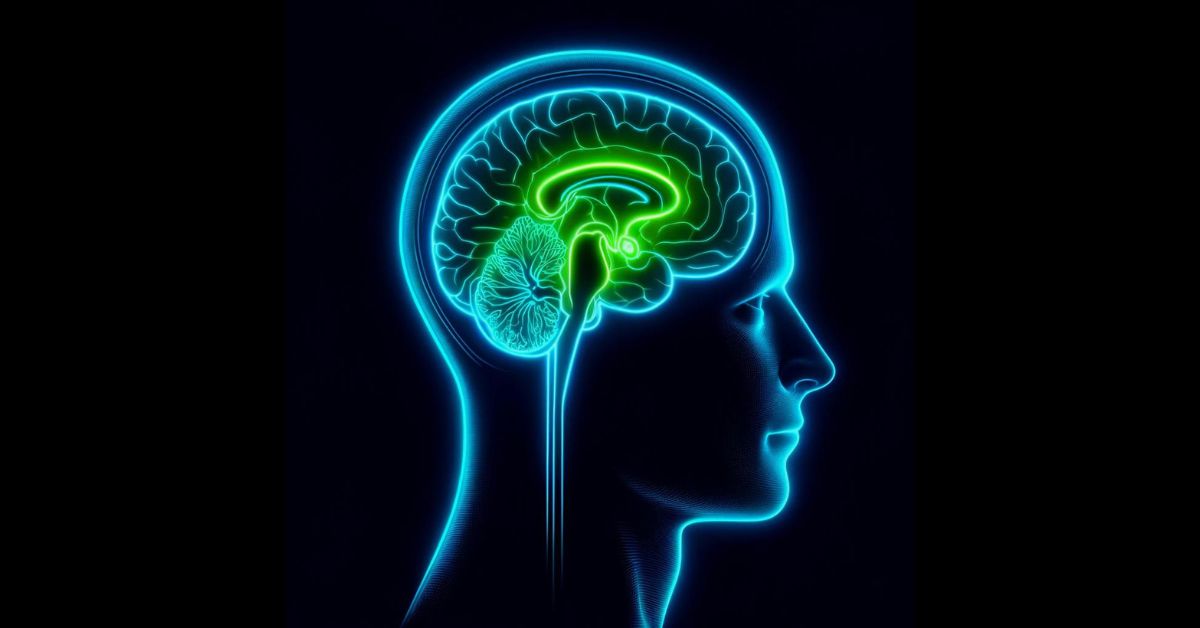Obesity has become a global health concern, affecting millions of individuals worldwide[1]. With the increasing prevalence of obesity, there is a growing need to understand the neural mechanisms behind weight management[2]. Recent scientific research has shed light on the critical role of various brain regions in regulating eating behavior, physical activity, and, ultimately, body weight[3]. One such region that has garnered significant attention is the anterior midcingulate cortex (aMCC).[4]
BEFORE WE GET INTO THE ARTICLE, PLEASE WATCH THIS VIDEO FROM ANDREW HUBERMAN:
The aMCC, a subregion of the cingulate cortex, has been implicated in a wide range of cognitive and emotional processes[5]. Emerging evidence suggests that the aMCC may also be crucial in weight management[6]. This article aims to explore the influence of the aMCC on eating behavior, physical activity, and potential interventions targeting this brain region for effective weight management strategies.
As we navigate the complexities of the brain-body relationship in the context of weight management, it is essential to recognize the importance of a multidisciplinary approach to weight management[7]. By understanding the role of the aMCC and other neural mechanisms, we can work towards developing more effective and personalized strategies to help you manage your weight, become stronger, and live a more active lifestyle.
The Anterior Midcingulate Cortex Explained
Examining the complexities of the brain reveals the anterior midcingulate cortex (aMCC) as a pivotal area influencing our cognitive and emotional landscapes[8]. This section aims to illuminate the role of the aMCC and its significant impact on behaviors that directly relate to weight management.
What is the Anterior Midcingulate Cortex?
The anterior midcingulate cortex (aMCC) is a fascinating and complex region nestled deep within the cerebral cortex, occupying a central position that bridges the gap between emotional and cognitive experiences. This area, though relatively small—roughly the size of a walnut and located near the frontal part of the brain—plays a disproportionately large role in our daily lives[9]. It is a crucial hub for processing a wide array of emotional and cognitive stimuli, integrating signals that influence decision-making, pain perception, and our emotional responses to the world around us.
Like the conductor of an orchestra, the aMCC coordinates various brain functions to produce a harmonious response to internal and external stimuli. Its strategic location and connections with other parts of the brain, including the limbic system and prefrontal cortex, enable it to mediate complex behaviors and reactions, from how we handle stress and fear to how we make choices and control impulses. The aMCC’s role in these processes makes it a key area of interest to understand not just weight management but also a broad spectrum of human behaviors and psychological conditions.
It’s a key player in:
- Decision Making: The aMCC evaluates risks and benefits, guiding our choices in daily life, including food intake and physical activity. Its role in decision-making extends to determining our responses to long-term goals versus immediate rewards, a critical aspect in making dietary choices and weight management.

- Emotion: By processing emotions, especially those related to discomfort and distress, the aMCC influences how emotional states can affect eating habits. Emotional eating, for instance, can be traced back to how the aMCC responds to emotional stimuli.
- Pain Perception: The aMCC’s involvement in interpreting physical pain and emotional suffering can influence our eating behaviors. For example, individuals might turn to food for comfort during periods of stress or pain, highlighting the aMCC’s role in the complex relationship between pain perception and eating patterns.
Understanding the aMCC’s functions provides insight into its complex role in our daily lives, influencing everything from choosing what to eat to reacting to stressful situations.
The aMCC and the Brain’s Reward System

The relationship between the anterior midcingulate cortex (aMCC) and the brain’s reward system is a cornerstone in understanding the neurological underpinnings of eating behaviors. This interaction is fascinating and crucial for deciphering how we make choices about food, how we experience pleasure from eating, and how we regulate those behaviors in the context of survival and well-being.
The aMCC, by its intricate connections with the brain’s reward pathways—primarily the mesolimbic dopamine system—plays a significant role in modulating our responses to food rewards. It helps evaluate the potential rewards of consuming certain foods against the backdrop of current physiological states, like hunger or satiety, and longer-term goals, such as health or weight loss. This evaluative process is vital for making decisions that align with our overall well-being and nutritional needs.
Moreover, the aMCC’s involvement goes beyond mere decision-making; it also influences how we emotionally respond to food rewards. It can amplify the pleasure we derive from eating highly palatable foods[10], contributing to their rewarding properties and, consequently, their potential overconsumption. On the flip side, it can also mediate feelings of guilt or regret after indulging, which can affect future eating behaviors and decision-making processes.
Understanding this complex interplay between the aMCC and the brain’s reward system offers invaluable insights into the mechanisms of cravings, overeating, and the challenges of diet adherence. It underscores the importance of considering the neurological and psychological factors in developing effective strategies for healthy eating and weight management.
This interaction is crucial for:
- Craving and Satiety Signals
The aMCC plays a crucial role in how we experience cravings[11] and process feelings of fullness. Its communication with other areas of the brain involved in reward processing can influence our propensity to seek out high-calorie foods and our ability to feel satisfied after eating.
- Reward and Punishment
The aMCC’s involvement in reward perception affects our motivation By understanding how the aMCC works in concert with the brain’s reward system, we can begin to appreciate its role in the complex behaviors associated with eating and weight management.
Scientific Evidence Linking the aMCC to Weight Management
A growing body of scientific evidence supports the intricate relationship between the aMCC and weight management. This section delves into the research findings that underscore the aMCC’s influence on eating behaviors, obesity, and the efficacy of weight loss interventions.
Research Findings on the aMCC and Eating Behavior
The Link Between aMCC Activity and Cravings
Research has consistently shown that the aMCC’s activity is closely linked to food cravings, especially for sugary and fatty foods. This suggests that individuals with heightened aMCC activity may struggle more with resisting these cravings, making weight management more challenging.
aMCC’s Role in Satiety and Hunger Signals
Studies indicate that the aMCC is instrumental in interpreting hunger and satiety signals. Disruptions or abnormalities in aMCC functioning can lead to overeating or an inability to feel full, factors that significantly contribute to weight gain and obesity.
The aMCC’s Role in Obesity and Weight Loss
Differences in aMCC Function in Individuals with Obesity
Emerging evidence reveals that the aMCC functions differently in individuals with obesity[12] compared to those of a healthy weight. This variance may influence how hunger and satiety signals are processed, affecting eating behaviors and susceptibility to weight gain.
Impact of Weight Loss on aMCC Activity
Intriguingly, interventions aimed at weight loss, including dietary changes and increased physical activity, have been associated with modifications in aMCC activity. These changes suggest a potential pathway through which lifestyle interventions can affect the brain’s response to food and eating behaviors.
The Psychological Aspect: Stress, Emotion, and Eating
The intricate relationship between our psychological state and eating behaviors is a key area of interest in understanding weight management. The anterior midcingulate cortex (aMCC) plays a crucial role in this relationship, mediating our response to stress and emotional stimuli, which in turn influences our eating patterns.
Stress Response and the aMCC
The aMCC is central to our body’s stress response, influencing how we cope with and react to stressors. Its involvement in the processing of stress and pain makes it a critical area for understanding stress-induced eating:
Stress-Induced Eating
The aMCC’s activation during stress can increase cravings for high-calorie, comforting foods. This mechanism is a way of coping with stress, providing temporary relief or distraction.
Impact on Weight Management
Chronic stress and the resultant stress-induced eating can contribute to weight gain and difficulty losing weight. Strategies aimed at managing stress can, therefore, play a crucial role in effective weight management.
Emotional Eating and the aMCC
Emotional eating, the tendency to consume food in response to emotional rather than physical hunger, is another behavior influenced by the aMCC:

The Role of Emotions
The aMCC’s role in processing emotional states[13] significantly impacts our likelihood of engaging in emotional eating. Negative emotions, in particular, can trigger eating behaviors aimed at emotional comfort.
Strategies for Managing Emotional Eating
Recognizing the role of the aMCC in emotional eating[14] can lead to targeted strategies that address the emotional roots of eating behaviors. Techniques such as meditation, mindfulness[15], cognitive-behavioral strategies, and emotional regulation skills can help mitigate the impact of emotions on eating habits.
Anxiety, Depression, and the aMCC
Connection to Mental Health
The aMCC’s functions extend to its involvement in anxiety and depression, conditions that are often linked to altered eating behaviors and weight management challenges.
Integrated Approaches to Treatment
Addressing mental health conditions and their relationship with the aMCC can lead to more holistic approaches to weight management, incorporating mental health support as a component of diet and exercise programs.
The aMCC and Physical Activity
The aMCC’s involvement in motor control and motivation
In addition to its role in eating behavior, the aMCC has been implicated in motor control and motivation, both of which are essential for engaging in physical activity. Studies have shown that the aMCC is activated during the performance of motor tasks, particularly those that require effort and coordination [16]. Moreover, the aMCC has been linked to the motivation to engage in physical activity, as it is involved in the processing of reward and the evaluation of effort costs [17].
Studies on the aMCC’s activation during exercise
Several studies have investigated the aMCC’s activation during exercise. For example, an fMRI study found that the aMCC was activated during a cycling task, and its activity was associated with the subjective experience of effort [18]. Another study using PET showed that the aMCC’s activity increased during a graded exercise test, suggesting its involvement in the regulation of physical exertion [19].
The aMCC’s role in overcoming physical discomfort and fatigue
Engaging in physical activity often involves overcoming physical discomfort and fatigue. The aMCC has been implicated in the ability to persist in the face of such challenges. A study using TMS found that stimulating the aMCC increased the ability to tolerate physical discomfort during a cold pressor test [20]. Another study showed that individuals with greater aMCC activity during a fatiguing task were more likely to persist in the task despite the increasing difficulty [21].
These findings suggest that the aMCC plays a crucial role in the motivation to engage in physical activity and the ability to overcome physical discomfort and fatigue, both of which are important for maintaining a physically active lifestyle.
Research on the aMCC’s involvement in maintaining exercise habits
A longitudinal study investigated the relationship between aMCC activity and exercise adherence over a 6-month period. The study found that individuals with greater aMCC activity during a baseline exercise task were more likely to adhere to their exercise program and maintain higher levels of physical activity throughout the study period. These findings suggest that the aMCC may play a role in the ability to sustain exercise habits over time.
Another study examined the effects of a mindfulness-based intervention on aMCC activity and exercise adherence. Participants who underwent the intervention showed increased aMCC activity during an exercise task and reported greater exercise adherence compared to a control group. This study highlights the potential of targeting the aMCC through mindfulness-based interventions to improve exercise adherence.
The potential of targeting the aMCC to improve exercise adherence
Given the aMCC’s involvement in motivation, effort evaluation, and exercise adherence, targeting this brain region may be a promising strategy for promoting long-term physical activity habits. Interventions that aim to enhance aMCC activity, such as neurofeedback training or brain stimulation techniques, may help individuals overcome barriers to exercise and maintain regular physical activity.
Furthermore, incorporating cognitive and behavioral strategies that engage the aMCC, such as goal-setting, self-monitoring, and problem-solving, may also be effective in improving exercise adherence. By targeting the aMCC through a combination of neural, cognitive, and behavioral interventions, individuals may be better equipped to maintain a physically active lifestyle and achieve their weight management goals.
Practical Implications for Weight Management
Understanding the role of the anterior midcingulate cortex (aMCC) in regulating eating behaviors, stress responses, and emotional states opens new avenues for developing effective weight management strategies. This section explores practical applications and interventions that can leverage our understanding of the aMCC to promote healthier eating habits and support weight loss efforts.
Modulating the aMCC for Better Weight Control
Advancements in neuroscience have led to innovative approaches aimed at modulating the activity of the aMCC, with implications for improving weight management outcomes:
Neurofeedback and Brain Stimulation Techniques
Emerging technologies such as neurofeedback and transcranial magnetic stimulation (TMS) offer possibilities for directly influencing the activity of the aMCC. By modulating its activity, these techniques may help reduce cravings, enhance satiety signals, and improve stress and emotional regulation, contributing to healthier eating behaviors and weight loss.
Mindfulness and Meditation
Practices such as mindfulness and meditation can indirectly affect the functioning of the aMCC by reducing stress, enhancing emotional regulation, and improving awareness of hunger and satiety cues. Regular engagement in these practices can support weight management by fostering a more mindful relationship with food and eating.
Lifestyle Changes and Behavioral Strategies
Beyond direct modulation of the aMCC, incorporating lifestyle changes and behavioral strategies can support the brain’s natural regulation of eating behaviors and weight management:
- Stress Management Techniques: Given the aMCC’s role in the stress response, strategies aimed at managing stress, such as yoga, deep breathing exercises, and engaging in hobbies or physical activities, can mitigate stress-induced and emotional eating.
- Cognitive-Behavioral Therapy (CBT): CBT can help address the cognitive and emotional aspects of eating behaviors by challenging and changing unhelpful thoughts and behaviors related to food and weight management. By improving emotional regulation and coping strategies, CBT can indirectly influence the aMCC’s role in emotional and stress-related eating.
- Dietary and Physical Activity Interventions: While not directly targeting the aMCC, balanced diets and regular physical activity can improve overall brain health and function, potentially enhancing the aMCC’s regulation of eating behaviors. Combining these interventions with strategies aimed at modulating aMCC activity can offer a comprehensive approach to weight management.
Integrating Techniques for Comprehensive Weight Management
The integration of direct aMCC modulation techniques with broader lifestyle and behavioral strategies represents a holistic approach to weight management. By addressing the underlying brain mechanisms that influence eating behaviors, as well as the psychological, emotional, and lifestyle factors that contribute to weight gain, these integrated strategies offer a promising path toward sustainable weight loss and healthier living.
Conclusion
The anterior midcingulate cortex (aMCC) plays a crucial role in weight management, influencing eating behavior, physical activity, and the ability to maintain weight loss over time. Through its involvement in cognitive control, emotional regulation, and decision-making, the aMCC is well-positioned to shape the complex behaviors and processes underlying successful weight management.
Current research highlights the potential of targeting the aMCC through various interventions, including non-invasive brain stimulation techniques, mindfulness-based interventions, and personalized approaches based on individual aMCC profiles. By continuing to investigate the aMCC’s role in weight management and develop innovative intervention strategies, researchers and healthcare professionals can work towards more effective and sustainable solutions to the global obesity epidemic.
Ultimately, the most successful weight management approaches will likely involve a combination of strategies that target the aMCC and other key brain regions, as well as behavioral, psychological, and environmental factors. By taking a multidisciplinary and integrative approach to weight management, we can help individuals achieve their health goals and promote overall well-being.
Frequently Asked Questions (FAQs) on the Anterior Midcingulate Cortex and Weight Management
Q: What is the anterior midcingulate cortex (aMCC)?
A: The anterior midcingulate cortex (aMCC) is a region in the brain that plays a pivotal role in emotional regulation, decision-making, and pain perception. It’s involved in the cognitive processes that influence our eating behaviors and stress responses, making it a key area of interest in understanding weight management.
Q: How does the aMCC affect my eating habits?
A: The aMCC influences eating habits through its role in the brain’s reward system, decision-making processes, and emotional responses. It affects how we perceive cravings and fullness, our impulse control, and our tendencies towards stress-induced or emotional eating.
Q: Can we control the aMCC to improve weight management?
A: Yes, emerging research suggests that techniques such as neurofeedback, transcranial magnetic stimulation (TMS), mindfulness, and cognitive-behavioral therapy can influence the activity of the aMCC. These interventions can help modulate the aMCC’s role in eating behaviors and stress responses, potentially leading to better weight management outcomes.
Q: Are there any practical strategies for modulating the aMCC’s activity?
A: Practical strategies include stress management techniques, engaging in regular physical activity, practicing mindfulness and meditation, and possibly exploring neurofeedback or TMS under professional guidance. These approaches can help manage the aMCC’s influence on eating behaviors and emotional regulation.
Q: Is the aMCC’s role in weight management the same for everyone?
A: Individual differences in brain structure and function mean the aMCC’s role in weight management can vary from person to person. Factors such as genetics, lifestyle, and environmental influences can affect how the aMCC regulates eating behaviors and stress responses in different individuals.
Q: Can changes in the aMCC lead to obesity or weight gain?
A: Research suggests that abnormalities or alterations in the functioning of the aMCC may contribute to behaviors associated with obesity or weight gain, such as increased cravings, poor impulse control, and a heightened response to stress or emotional stimuli. However, obesity is a complex condition with multiple contributing factors, including but not limited to aMCC activity.
Q: Are interventions targeting the aMCC safe?
A: Interventions like neurofeedback and TMS are generally considered safe but must be performed under the guidance of qualified professionals. These techniques are non-invasive and have been used for various conditions, including depression and anxiety, with minimal side effects. However, individual experiences may vary, and it’s important to consult with healthcare providers before starting any new treatment.
Q: How does stress management affect the aMCC and weight management?
A: Effective stress management can reduce the activity in the aMCC associated with stress responses, potentially decreasing stress-induced cravings and emotional eating. Techniques that promote relaxation and emotional regulation, such as mindfulness and meditation, can positively impact the aMCC’s role in stress and eating behaviors.
Q: What role does diet play in modulating the aMCC’s activity?
A: While direct research on diet’s effect on the aMCC’s activity is still emerging, a healthy diet can contribute to overall brain health and function, which may indirectly influence the aMCC’s role in weight management. Nutrient-rich foods support brain health, potentially enhancing cognitive function and emotional regulation related to eating behaviors.
Q: Can physical activity influence the aMCC’s function?
A: Yes, physical activity has been shown to have numerous benefits on brain health and function, including potential effects on the aMCC. Regular exercise can improve mood, reduce stress, and enhance cognitive function, which may positively influence the aMCC’s role in decision-making and emotional regulation, contributing to healthier eating patterns and weight management.
References:
- World Health Organization. (2021). Obesity and overweight. https://www.who.int/news-room/fact-sheets/detail/obesity-and-overweight
- Schwartz, M. W., Seeley, R. J., Zeltser, L. M., Drewnowski, A., Ravussin, E., Redman, L. M., & Leibel, R. L. (2017). Obesity pathogenesis: An Endocrine Society scientific statement. Endocrine Reviews, 38(4), 267-296. https://doi.org/10.1210/er.2017-00111
- Volkow, N. D., Wang, G. J., Tomasi, D., & Baler, R. D. (2013). Obesity and addiction: Neurobiological overlaps. Obesity Reviews, 14(1), 2-18. https://doi.org/10.1111/j.1467-789X.2012.01031.x
- Edmund T Rolls, Ruiqing Feng, Wei Cheng, Jianfeng Feng, Orbitofrontal cortex connectivity is associated with food reward and body weight in humans, Social Cognitive and Affective Neuroscience, Volume 18, Issue 1, 2023, nsab083, https://doi.org/10.1093/scan/nsab083
- Shackman, A. J., Salomons, T. V., Slagter, H. A., Fox, A. S., Winter, J. J., & Davidson, R. J. (2011). The integration of negative affect, pain, and cognitive control in the cingulate cortex. Nature Reviews Neuroscience, 12(3), 154-167. https://doi.org/10.1038/nrn2994
- Poulimeneas, D., Yannakoulia, M., Anastasiou, C. A., & Scarmeas, N. (2018). Weight loss maintenance: Have we missed the brain? Brain Sciences, 8(9), 174. https://doi.org/10.3390/brainsci8090174
- Heymsfield, S. B., & Wadden, T. A. (2017). Mechanisms, pathophysiology, and management of obesity. New England Journal of Medicine, 376(3), 254-266. https://doi.org/10.1056/NEJMra1514009
- Stevens FL, Hurley RA, Taber KH, Hurley RA, Hayman LA, Taber KH. Anterior Cingulate Cortex: Unique role in cognition and emotion. J Neuropsychiatry Clin Neurosci. 2011;23:121–5. doi: 10.1176/jnp.23.2.jnp121.
- Domic-Siede, M., Irani, M., Valdés, J., Perrone-Bertolotti, M., & Ossandón, T. (2021). Theta activity from frontopolar cortex, mid-cingulate cortex and anterior cingulate cortex shows different roles in cognitive planning performance. NeuroImage, 234, 117557. https://doi.org/10.1016/j.neuroimage.2020.117557
- Stoeckel LE, Weller RE, Cook EW 3rd, Twieg DB, Knowlton RC, Cox JE. Widespread reward-system activation in obese women in response to pictures of high-calorie foods. Neuroimage. 2008 Jun;41(2):636-47. doi: 10.1016/j.neuroimage.2008.02.031. Epub 2008 Mar 4. PMID: 18413289.
- Koban, L., Wager, T.D. & Kober, H. A neuromarker for drug and food craving distinguishes drug users from non-users. Nat Neurosci 26, 316–325 (2023). https://doi.org/10.1038/s41593-022-01228-w
- Syan SK, McIntyre-Wood C, Minuzzi L, Hall G, McCabe RE, MacKillop J. Dysregulated resting state functional connectivity and obesity: A systematic review. Neurosci Biobehav Rev. 2021 Dec;131:270-292. doi: 10.1016/j.neubiorev.2021.08.019. Epub 2021 Aug 20. PMID: 34425125.
- Etkin A, Egner T, Kalisch R. Emotional processing in anterior cingulate and medial prefrontal cortex. Trends Cogn Sci. 2011 Feb;15(2):85-93. doi: 10.1016/j.tics.2010.11.004. Epub 2010 Dec 16. PMID: 21167765; PMCID: PMC3035157.
- Pribic T, Kilpatrick L, Ciccantelli B, Malagelada C, Accarino A, Rovira A, Pareto D, Mayer E, Azpiroz F. Brain networks associated with cognitive and hedonic responses to a meal. Neurogastroenterol Motil. 2017 Jun;29(6):10.1111/nmo.13031. doi: 10.1111/nmo.13031. Epub 2017 Jan 23. PMID: 28116817; PMCID: PMC6615895.
- Torske A, Bremer B, Hölzel BK, Maczka A, Koch K. Mindfulness meditation modulates stress-eating and its neural correlates. Sci Rep. 2024 Mar 27;14(1):7294. doi: 10.1038/s41598-024-57687-7. PMID: 38538663; PMCID: PMC10973375.
- Chong, J. S., Ng, G. J., Lee, S. C., & Zhou, J. (2017). Salience network connectivity in the insula is associated with individual differences in interoceptive accuracy. Brain Structure and Function, 222(4), 1635-1644. https://doi.org/10.1007/s00429-016-1297-7
- Macoveanu, J., Rowe, J. B., Hornboll, B., Elliott, R., Paulson, O. B., Knudsen, G. M., & Siebner, H. R. (2013). Serotonin 2A receptors contribute to the regulation of risk-averse decisions. NeuroImage, 83, 35-44. https://doi.org/10.1016/j.neuroimage.2013.06.063
- Fonville, L., Giampietro, V., Williams, S., Simmons, A., & Tchanturia, K. (2014). Alterations in brain structure in adults with anorexia nervosa and the impact of illness duration. Psychological Medicine, 44(9), 1965-1975. https://doi.org/10.1017/S0033291713002389
- Boehm, I., Geisler, D., King, J. A., Ritschel, F., Seidel, M., Deza Araujo, Y., Petermann, J., Lohmeier, H., Weiss, J., Walter, M., Roessner, V., & Ehrlich, S. (2014). Increased resting state functional connectivity in the fronto-parietal and default mode network in anorexia nervosa. Frontiers in Behavioral Neuroscience, 8, 346. https://doi.org/10.3389/fnbeh.2014.00346
- Karhunen, L. J., Lappalainen, R. I., Vanninen, E. J., Kuikka, J. T., & Uusitupa, M. I. (1997). Regional cerebral blood flow during food exposure in obese and normal-weight women. Brain, 120(9), 1675-1684. https://doi.org/10.1093/brain/120.9.1675
- Carnell, S., Gibson, C., Benson, L., Ochner, C. N., & Geliebter, A. (2012). Neuroimaging and obesity: Current knowledge and future directions. Obesity Reviews, 13(1), 43-56. https://doi.org/10.1111/j.1467-789X.2011.00927.x

